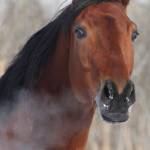Upper Respiratory Infection in Horses

Runny nose, cough, fever, listless, or depressed behavior…if your horse is showing these signs, there’s a good chance he has an upper respiratory infection. Fall, winter, and spring are prime time for diseases of the respiratory tract, and are often caused by one or more of four common pathogens. A study at the University of California, Davis looked at the prevalence of these pathogens and their seasonal relevance for horses.
When 761 horses with signs of upper respiratory disease were tested for various pathogens, equine herpes virus-4 (EHV-4) was found most commonly (82 horses). Fall and winter were the peak times for EHV-4 infection.
Equine influenza virus was the next most common finding (60 horses), especially in winter and spring. Streptococcus equi, the cause of strangles, was found in 49 horses, also in winter and spring. EHV-1 was a cause of disease in 23 horses and was least common in summer months.
Results of the study showed that many of the sick horses had been vaccinated against the pathogens they carried. The researchers theorized that, because vaccination records were incomplete in many cases, the horses had most likely not been vaccinated on a regular basis.
Consulting with a veterinarian as to which vaccinations are recommended and keeping a regular schedule of vaccinations for all horses is a first step in protecting horses against respiratory infections and other diseases. A horse’s age, use, and frequency of travel will be taken into account in deciding which vaccinations are indicated. The American Association of Equine Practitioners recommends a core group of vaccinations that all horses should have, while others are suggested depending on risk factors in various areas.
Horses with respiratory illness should be examined by a veterinarian and should be kept away from healthy horses. To avoid exposing other horses to disease, owners should care for the sick horses after caring for healthy animals, and should not use the same buckets, tack, and grooming supplies for sick and well horses. Those coming in contact with a sick horse should wash their hands, and equipment should be disinfected before it is used on other horses.








